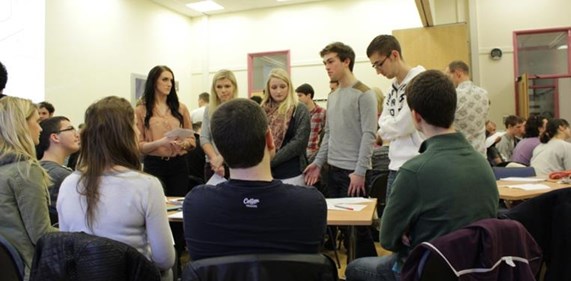Group Size
?
1.) Small group (teams of 4-6)
2.) Individual Task
3.) Large Group
4.) Any
Small group (teams of 4-6)
Learning Environment
?
1.) Lecture Theatre
2.) Presentation Space
3.) Carousel Tables (small working group)
4.) Any
5.) Outside
6.) Special
Any
QAA Enterprise Theme(s)
?
1.) Creativity and Innovation
2.) Opportunity recognition, creation and evaluation
3.) Decision making supported by critical analysis and judgement
4.) Implementation of ideas through leadership and management
5.) Reflection and Action
6.) Interpersonal Skills
7.) Communication and Strategy
1Creativity and Innovation
2Opportunity recognition‚ creation and evaluation
5Reflection and Action
6Interpersonal Skills
7Communication and Strategy
2013 saw the adoption of an enterprise education module entitled ‘Commercialising Innovation’ by the Cardiff School of Physics and Astronomy, making it available to 21 students from the physics cohort. Delivered via an innovative collaboration between Cardiff University enterprise, engineering and physics staff, the module encourages elements of cross disciplinary cooperation between students.
Cardiff University Enterprise worked closely with Dr. Annabel Cartwright, Dr. Jeremy Hall and Dr. Peter Hargrave, all supportive advocates for the adoption of the module by the Cardiff School of Physics and Astronomy.
The adoption of the Commercialising Innovation module provides Cardiff University students of physics with an applied introduction to the commercial process whilst providing opportunity for the development of practical enterprise and employability skills intended for application within industrial contexts.
During the first year of delivery a partnership between Cardiff Schools of Engineering and Physics reflects the needs of industry for graduates who are experienced and have the appropriate skills in order to work collaboratively with colleagues from a variety of differing disciplinary specialisms in order to take innovative ideas to market. Exposure to one another’s discipline in the context of the commercialisation module provides both physics and engineering students with broader insight into the potential modes of application of their own disciplinary learning within an industry based context.
Examples include;

Examples of student reflection;
“I really feel that this project, because it has been so different from a usual physics course, has developed my character in a way I wouldn’t have otherwise been exposed to.”
“Aside from acquiring business knowledge, I also feel that through the completion of this module I have developed a skill set that is essential for life after university.”
"I would highly recommend this module to others, as I think it is a nice change from the normal modules, but it is also very beneficial in teaching skills required for the future in jobs or other presentation based modules.”
The examples of curriculum development for enterprise related outcomes were originally outlined by Neil Coles at the International Enterprise Educators Conference under the heading 'From Archaeology to Zoology; an A-Z of enterprise in the curriculum'. For his work in contextualising enterprise for any subject, Neil won the 2013 National Enterprise Educator Award.